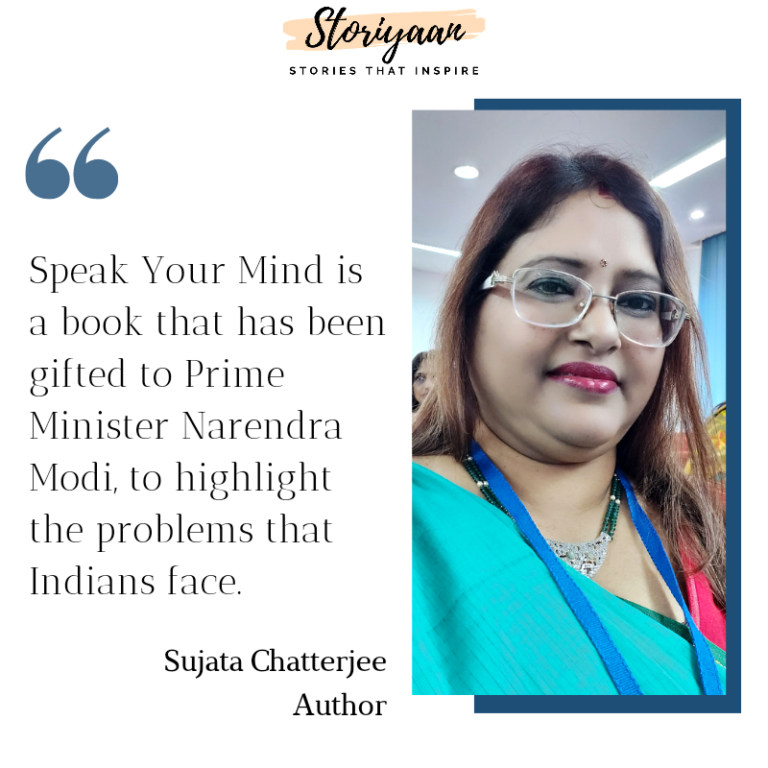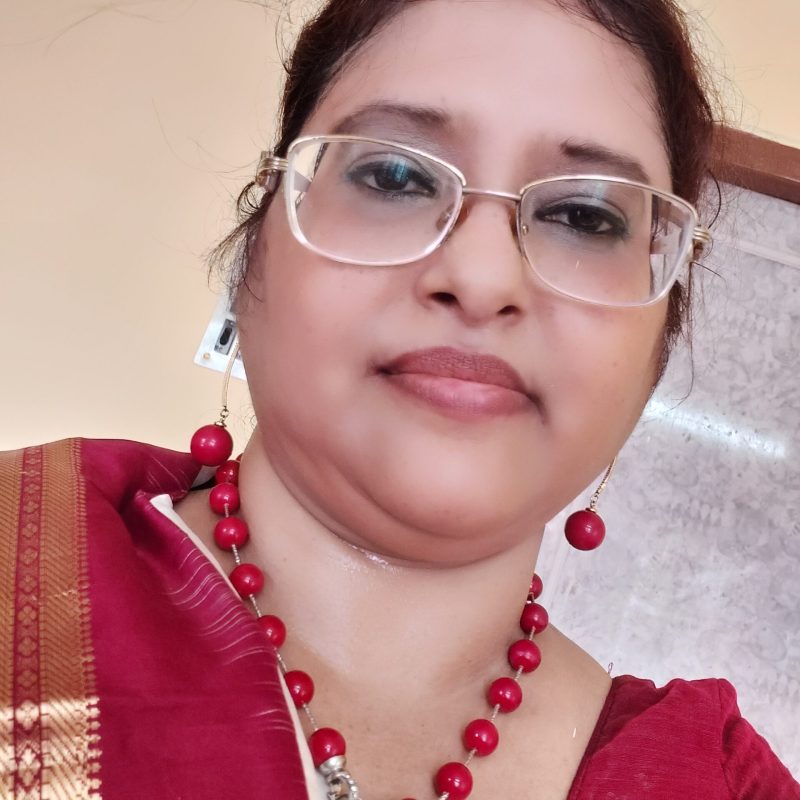Right from her childhood and sports to her book, poems, and illustrations, Dr. Sujata Chatterjee lays it all out. She is a doctor who has found her home in the solemn pages of literature.
In a chat with Storiyaan, she speaks about the challenges she has faced in the past and also talks about how she accepts negative criticism. With several accolades to her name, the bright and talented Dr. Sujata shares interesting details about her life. What she had to say about her process of writing is sure to intrigue you.

Dr. Sujata Chatterjee: Surgeon of Words
Interview
Questions and answers
Can you tell us a little bit about the reasons you decided to become an author? Did writing interest you even during your childhood?
I was very good in English Literature and Language right from my childhood. I started building up my interest in writing poems since I was eight years old. I used to write in bits of paper or the pages of a diary, hoping one day the world will read my work. My write-ups found their way to the school and college magazines and notice boards. It was then that I started getting noticed by the public. But the pressure of academics and my dream to become a doctor one day stopped me from pursuing English Literature. But gradually, when I became a doctor, I started writing again, this time, medical stories. This was the time I decided to become an author.
In your interview with Songhoti, on Women's Day, 2020, you spoke about breaking the stigmas and superstitions for women; have you ever faced any such personal conflict?
I passed my HS in 1987. I was an eighteen-year-old girl then. I was very good at sports, especially Badminton and Table Tennis. I entered the medical college then and wanted to participate in the college tournament for Badminton. I was selected and had to play three games to win the Intra college title in the mixed doubles. But those days the society was very conservative. Though my parents always encouraged my sports event, my colleagues would turn their nose at my achievements. They had an idea that I was very extroverted and the society never looked kindly at my expertise. So no one turned up to cheer me during the tournament. I won 2 matches out of 3 and got the title of the best sportswoman of the college. But nobody was there to applaud me.
Being a co-author of a book like 'Speak Your Mind', how important do you think it is today to do so?
Speak Your Mind is a book which deals with the problems that we Indians face in our lives and it is a book that has been gifted to Prime Minister Narendra Modi, to highlight these aspects so that we achieve excellence. I had written one poem on organ donation and another story on Euthanasia or Mercy Killing. Organ donation is a major issue in the medical world nowadays. People resort to various unfair means to earn money through organ donation. But if you go by the law, organ donation can help patients in various ways. My write up was about cornea donation after death. Also, Euthanasia is not legal in India, but in many parts of the world, it has been legalised for terminally ill patients. These patients are usually on life support, and they are draining both money and energy from the patient party. Euthanasia can be legalised but with stringent rules and may relieve both the patient and their relatives from the disease.
In your poem 'The Freedom' from your book 'Looking through the prism', there is a line stating "freedom from the chains", do you witness these chains actually being broken around you?
Freedom is poetry dedicated to the freedom struggle in India. If you read the last paragraph, you will see a line; I wish I were a birdie, Forever I shall sing, Songs of freedom struggle, Good news I would bring as our country won the freedom, this has been compared to the birds, who have been chained and kept in a cage, later as they are released, and they fly away.
Your collection of poems, "looking through the prism" is filled with inspiration and motivation. How do you think someone can keep themselves motivated? Do you have any personally tested out methods?
Yes, I am very close to Nature. Looking Through The Prism is a book which has many poems based on Nature. Our lives have been compared to Nature, like night and day, winter and spring, and every dark cloud has a silver lining, which is very positive and motivational. It shows us that joy and woe are woven fine and that after every darkness, there is a light at the end of the tunnel. I always personally believe this and remain positive in every situation.
Why did you choose to have illustrations beside every poem in the book? Did you design these illustrations yourself?
I thought that the illustrations with every poem in the book would make it easy for everyone to understand what I want to portray. Even kids can go through these poems and refer to the illustrations to understand poetry.
No, though the idea was mine, these illustrations have been made by my friend Bhaskar Das. He is a fashion designer and an amazing artist.
Can we know a bit about the insights behind the title "looking through the prism"? Does it have anything to do with the fact that prisms refract light to produce rainbows?
The full name of the book is Looking Through The Prism: Spectrum. We know that when a light ray is passed through a Prism, it produces a Spectrum of light, which resembles a rainbow. My poems are like a rainbow or a spectrum of light, denoting the colours of Nature. There are many poems on Nature, like Colors Of Life, Rainbow, Musical Note Of Nature and others. Life always has different colours to offer to us, just like the beauty of Nature.
Every short story penned by you in "Flights of Fantasy", leaves an impact on the reader. How did you come up with these stories? Are they based on real-life experiences and people?
There are some stories in Flights Of Fantasy, which are based on real-life incidences.
The New Breath and The Dominating Spirit occurred during one of my cases of Anesthesia, though the names have been changed. Message in the Mist is a true story in one of my journey by air. E- Prejudices is taken from real-life experiences with my father, though I have conjured the second half of the story. It is basically a mixture of experiences, both real-life and tales from my heart.
Do you appreciate negative criticism? If yes, can you tell us one feedback or critique that you have received that helped you better your craft?
Of course, negative criticism does help to craft out better write-ups. Although I have not yet received any negative criticism, there was one instance in the Delhi World Book Fair, when a few students came to visit our stall, and I was there signing my book, Looking Through The Prism for my readers. The students were handed over the book, and they flipped through the book and went through the pages. At the end of half an hour, she returned the book saying, she did not like the poems on Nature. She prefers dark poems, where there is a lot of destruction and devastation.
I was a little taken aback. It dawned on me that this generation probably is interested in dark poetry, rather than motivational ones. They love the essence of depression and sadness. But I have never been able to write dark poems, ever, because my Nature is not like that. I am rather an optimist and writing poetry with the essence of beauty is important for me, even though this generation prefers the other way around.
While writing, an author's mind is overflowing with emerging ideas and sequences. Have you ever experienced any 'conflict of thoughts' while doing so?
Certainly yes. In the book Flights Of Fantasy, the story, An Answer Untold, I had been struggling with the idea of how to end the tale. Should it be a story with a happy ending, where the prince and princess live happily ever after, or should there be a little twist in the ending? With this conflict, I spent days trying to work it out. I left the story halfway through, thinking about what would suit better. Till at last, I decided on the twist to the ending of the story. This story has been nominated for the Story to Screen Awards, along with the story, A New Breath.
What would your primary reaction be, if you are told that one of your short stories is being adapted into a movie or short film?
I would be overwhelmed and overjoyed, of course. 2 of my stories, A New Breath and An Answer Untold from the book Flights Of Fantasy has been nominated for a movie or a short film in Story to Screen Awards.
Quick 5
1. Classical music or lo-fi music – Classical Music
2. Novels or short stories– Short stories
3.Typewriter or computer– Computer
4. If you could go back in time and meet one author, who would it be?– William Wordsworth
5. What do you prefer more being a doctor or a writer? – Doctor

